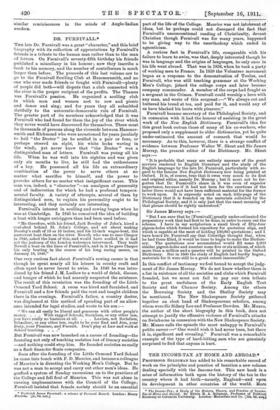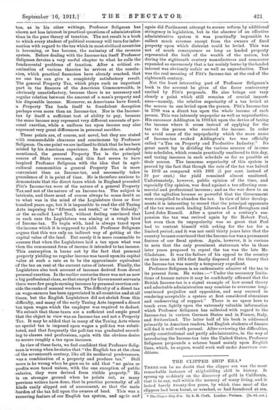THE INCOME-TAX AT HOME AND ABROAD" PROFESSOR SELIGMAN has added
to his remarkable record of work on the kinciples and practice of taxation a new volume dealing specially with the Income-tax. This new book is a mine of information both upon the history of the tax in the country, where it had birth—namely, England—and upon its development in other countries Of the - world. - Mere • The Income-Tax A Study of the History, Theory, and Practice of Income- Tas Home and Abioad. By. Edwin R. A. Seligman, Professor of Political Economy:at Columbia University. London: Macmillan and Co. [12s. 6d. nei.j
too, as in his other writings, Professor Seligman has alovvn not less interest in practical questions of administratiou than in the pure -theory of taxation. The vet result is a book to which every'student of political economy will turn for
million with regard to the tax which in most civilized countries is becoming, or has become, the mainstay of the revenue system. Before dealing with the Income-tax itself Professor Seligman devotes a very useful chapter to what he calls the fundamental problems of taxation. After a critical ex- amination of various theories he arrives at the concha- 610/1, which practical financiers have already reached, that no one tax can give a completely satisfactory result. 'The general Property Tax, which plays such an important part in the finances of the American Commonwealth,- is -obviously unsatisfactory, because there is no necessary and regular relation between the amount of a man's property and his disposable income. Moreover, as Americans have found, a Property Tax lends itself to fraudulent deception perhaps even more than an Income-tax. Nor is the Income- tax by itself a sufficient test of ability to pay, because the same income may represent very different amounts of per- -sonal exertion, while a uniform tax upon income may also -represent very great differences in personal sacrifice.
These points are, of course, not novel, but they are staled with commendable clearness and conciseness by Professor :Seligman. On one point we are inclined to think that he has been misled by his American experience. In America, as already mentioned, the general Property Tax is the principal source of State revenues, and this fact seems to have inspired Professor Seligman with the idea that in agri- cultural communities a general Property Tax is more 'convenient than an Income-tax, and necessarily takes _precedence of it in point of time. He is therefore anxious to demonstrate that the direct taxes which in England preceded Pitt's Income-tax were of the nature of a general Property -Tax and not of the nature of an Income-tax. The subject is intricate, and there must of course always be some doubt as to what was in the mind of the Legislature three or four 'hundred years ago, but it is impossible to read the old Taxing Acts imposing the "fifteenth and tenth," or "the Subsidy," .or the so-called Land Tax, without feeling convinced that in each cage the Legislature was aiming at a rough kind .of Income-tax. To begin with, land is always taxed upon the income which it is supposed to yield. Professor Seligman argues that this was only an indirect way of getting at the • capital value of the land. But surely it is more reasonable to assume that when the Legislature laid a tax upon what was -then the commonest form of income it intended to tax income. 'This assumption is borne out by the fact that personal property'yielding no regular income was taxed upon its capital value at such a rate as to be the approximate equivalent 'of the tax on rent at the current rates of interest. Finally, the Legislature also took account of incomes derived from direct -personal exertion. In the earlier centuries there was not as now -a big professional class, so that except for Government servants there were few people earning incomes by personal exertion out- -side the ranks of manual workers. The difficulty of a direct tax -on wage-earners has been appreciated in all countries and at all times, but the English Legislature did not shrink from this difficulty, and many of the early Taxing Aets imposed a direct -tax upon wages which the employer was required to deduct. We submit that these taxes are a sufficient and ample proof that the object in- view was an Income-tax and not a Property Tax. It may be added that in many of the Taxing Acts where no special • tax is imposed upon wages a poll-tax was substi- tuted, and that frequently the poll-tax was graduated accord- ing to classes and professions, again with the obvious desire
• to secure roughly a tax upon incomes.
In view of these facts, we feel confident that Professor Selig- man is wrong when he states that "the English tax at the close -of the seventeenth century, like all its mediteval predecessors, was a combination of a property and produce tax." Still more is he wrong when he goes on to add that "no gains or 'profits were taxed unless, with the one exception, of public ,salaries, they were derived from visible property." ' He is on stronger ground when be points out, as many previous writers have done, that in practice personalty of all kinds easily slipped out of assessment, so that the main :burden of the tax fell upon the owners of land. This was a tecurring feature of our English tax system, and again and again did .Parliament attempt te secure reform by additional stringency in legislation, but in the absence of an effective administrative system it was practically impossible to collect much revenue except from the owners of fixed' property upon which distraint could be levied. This was not of much consequence so long as landed property represented the bulk of the wealth of the nation, but during the eighteenth century manufactures and commerce expanded so enormously that a tax mainly borne by the landed interest was obviously unfair as well as unproductive. That was the real meaning of Pitt's Income-tax at the end of the eighteenth century.
Not the least -interesting part of Professor Seligman's book is the account be gives of the fierce controversy excited by Pitt's proposals. He also brings out very clearly a point which still remains of crucial import- ance--namely, the relative superiority of a tax levied at the source to one levied upon the person. Pitt's Income-tax in 1799 was a direct tax upon the whole income of each person. This was intensely unpopular as well as unproductive. His successor Addington in 1803 hit upon the device of taxing the income where it arose instead of applying for the tax to the person who received the income. In order to avoid some of the unpopularity which the mere name of Income-tax evoked Addington's tax was officially called "a Tax on Property and Productive Industry." Its great merit lay in dividing the various sources of income into schedules, which remain practically unaltered to this day, and taxing incomes in each schedule as far as possible at their source. The immense superiority of this system is proved by the fact that though the rate of the tax was halved in 1803 as compared with 1801 (5 per cent. instead of 10 per cent.) the yield remained almost unaltered. Unfortunately, however, public opinion of the time, and especially City opinion, was dead against a tax affecting com- mercial and professional incomes ; and as the war drew to an end the agitation became so powerful that the Government were compelled to abandon the tax. In view of later develop- ments it is interesting to record that the principal opponents of the tax were such leading Liberals as Lord Brougham and Lord John Russell. After a quarter of a century's sus- pension the tax was revived again by Sir Robert Peel, but even then its unpopularity was so great that Peel had to content himself with asking for the tax for a limited period; and it was not until thirty years later that the country became convinced that the Income-tax was a permanent feature of our fiseal system. Again, however, it is curious to note that the only prominent statesman who in these later years proposed to repeal the tax was the late Mr. Gladstone. It was the failure of his appeal to the country on this issue in 1874 that finally disposed of the theory that the Income-tax was merely a temporary expedient.
Professor Seligman is an enthusiastic admirer of the tax in its present form. He writes :—" Under the necessary limita- tions of human nature it may be confidently affirmed that the British Income-tax is a signal example of how sound theory and admirable administration may eombine to overcome long- continued prejudice and opposition, and may succeed in rendering acceptable a system at first considered obnoxious and undeserving of support." There is no space here to touch even lightly upon the extremely valuable information which Professor Seligman has collected with regard to the Income-tax in various German States and in France, Italy, and Switzerland. The latter half of his book is addressed primarily to American readers, but English students of finance will find it well worth perusal. After reviewing the difficulties, partly constitutional and partly administrative, in the way of introducing the Income-tax into the United States, Professor Seligman propounds a scheme based mainly upon. English lines, which, he argues, would work well under American con- ditions.











































 Previous page
Previous page